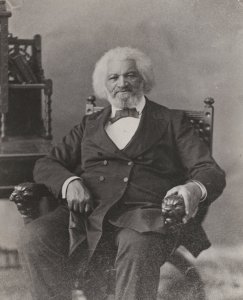Liberty Matters
Frederick Douglass on Abraham Lincoln
 In "On Douglass and Righteous Violence," Peter C. Myers characterizes Frederick Douglass and Abraham Lincoln as "the two greatest apostles of the natural-rights doctrine in 19th-century America." Although Douglass is certainly a reasonable candidate for this high ranking, I was surprised by the inclusion of Lincoln, who would not even make my top-100 list.
In "On Douglass and Righteous Violence," Peter C. Myers characterizes Frederick Douglass and Abraham Lincoln as "the two greatest apostles of the natural-rights doctrine in 19th-century America." Although Douglass is certainly a reasonable candidate for this high ranking, I was surprised by the inclusion of Lincoln, who would not even make my top-100 list.Many abolitionists were highly critical of Lincoln and did not warm up to him until after the Emancipation Proclamation (Jan. 1, 1863). Although Lincoln was genuinely opposed to slavery, he attacked abolitionists and advocated a number of policies that they abhorred, such as colonization and gradualism. Lincoln was commonly seen by abolitionists as an opportunist who sacrificed antislavery principles to political expediency. Even 11 years after Lincoln's assassination, Douglass, during his "Oration in Memory of Abraham Lincoln" (April 14, 1876), while praising Lincoln as a great man, could not resist mentioning his many faults in regard to slavery and race.
Lincoln, Douglass said to a predominantly black audience, "was preeminently the white man's President, entirely devoted to the welfare of white men. He was ready and willing at any time during the first years of his administration to deny, postpone, and sacrifice the rights of humanity in the colored people to promote the welfare of the white people of this country."[77] Douglass continued:
He came into the Presidential chair upon one principle alone, namely, opposition to the extension of slavery. His arguments in furtherance of this policy had their motive and mainspring in his patriotic devotion to the interests of his own race. To protect, defend, and perpetuate slavery in the states where it existed Abraham Lincoln was not less ready than any other President to draw the sword of the nation. He was ready to execute all the supposed guarantees of the United States Constitution in favor of the slave system anywhere inside the slave states. He was willing to pursue, recapture, and send back the fugitive slave to his master, and to suppress a slave rising for liberty, though his guilty master were already in arms against the Government. The race to which we belong were not the special objects of his consideration.[78]
Douglass asserted that Lincoln "loved Caesar less than Rome" and that "the Union was more to him than our freedom."[79] So why should black people venerate Lincoln as a great man? The explanation given by Douglass is vague and borders on mysticism at times. Lincoln, whatever his failings may have been, was "at the head of a great movement" that would inevitably lead to the abolition of slavery. Under his "wise and beneficent rule" racial prejudice was "rapidly fading away," especially as black men were permitted to enlist in the Union army and fight for their own freedom.[80] Especially significant for Douglass was the Emancipation Proclamation, even though it was expressly presented as a "fit and necessary war measure" for suppressing the rebellion and emancipated only those slaves in areas controlled by the Confederates.
Although Douglass's remarks about Lincoln are open to different interpretations, he seems to have regarded Lincoln as the proverbial Great Man who was compelled by the forces of history to do the right thing. But he did not seem to regard Lincoln as one of the greatest apostles of natural rights of his time. Douglass probably would have reserved that high honor for William Lloyd Garrison, Wendell Phillips, Gerrit Smith, and other fellow abolitionists.
Endnotes
[77.] Frederick Douglass: Selected Speeches and Writings, ed. Philip S. Foner, abridged by Yuval Taylor (Chicago: Lawrence Hill Books, 1999), 618.
[78.] Ibid.
[79.] Ibid., 620.
[80.] Ibid.
Copyright and Fair Use Statement
“Liberty Matters” is the copyright of Liberty Fund, Inc. This material is put on line to further the educational goals of Liberty Fund, Inc. These essays and responses may be quoted and otherwise used under “fair use” provisions for educational and academic purposes. To reprint these essays in course booklets requires the prior permission of Liberty Fund, Inc. Please contact oll@libertyfund.org if you have any questions.